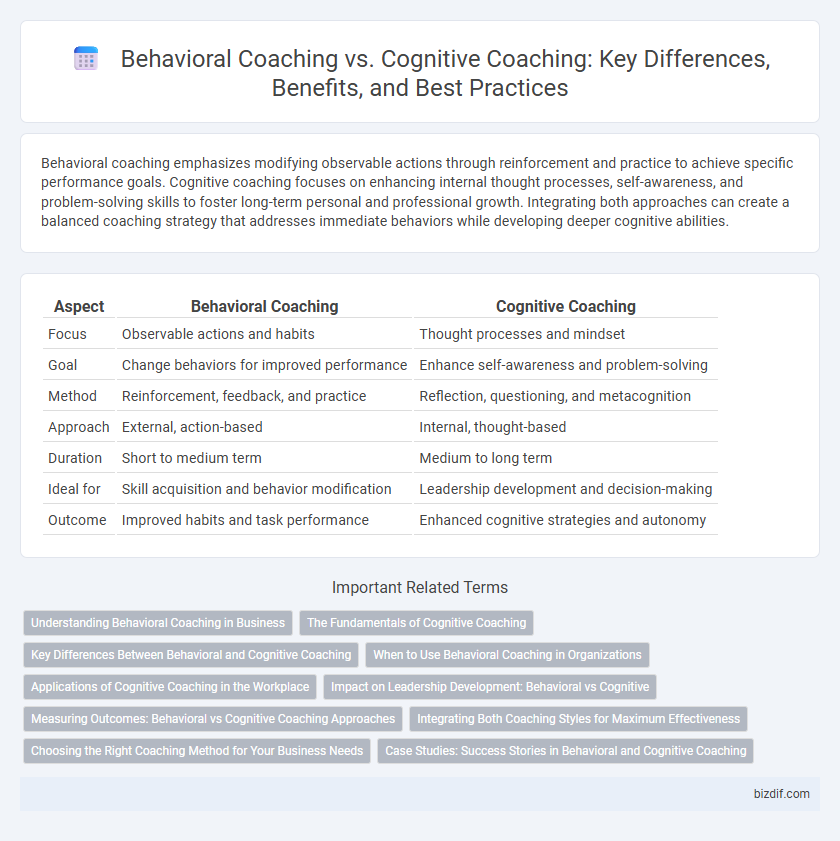Behavioral coaching emphasizes modifying observable actions through reinforcement and practice to achieve specific performance goals. Cognitive coaching focuses on enhancing internal thought processes, self-awareness, and problem-solving skills to foster long-term personal and professional growth. Integrating both approaches can create a balanced coaching strategy that addresses immediate behaviors while developing deeper cognitive abilities.
Table of Comparison
| Aspect | Behavioral Coaching | Cognitive Coaching |
|---|---|---|
| Focus | Observable actions and habits | Thought processes and mindset |
| Goal | Change behaviors for improved performance | Enhance self-awareness and problem-solving |
| Method | Reinforcement, feedback, and practice | Reflection, questioning, and metacognition |
| Approach | External, action-based | Internal, thought-based |
| Duration | Short to medium term | Medium to long term |
| Ideal for | Skill acquisition and behavior modification | Leadership development and decision-making |
| Outcome | Improved habits and task performance | Enhanced cognitive strategies and autonomy |
Understanding Behavioral Coaching in Business
Behavioral Coaching in business centers on modifying specific workplace actions to improve performance and productivity through targeted feedback and reinforcement techniques. It emphasizes observable behaviors and practical skill development, fostering measurable improvements aligned with organizational goals. This approach contrasts with Cognitive Coaching, which focuses on enhancing thought processes and decision-making skills.
The Fundamentals of Cognitive Coaching
Cognitive Coaching centers on enhancing a coachee's self-directed learning through metacognitive strategies and reflective questioning that promote problem-solving and critical thinking skills. This approach relies on a foundation of trust, collaborative dialogue, and the coach's ability to facilitate the coachee's internal thought process rather than offering direct advice. Core principles include fostering autonomy, encouraging self-monitoring, and guiding individuals to develop awareness of their cognitive processes for sustained personal and professional growth.
Key Differences Between Behavioral and Cognitive Coaching
Behavioral coaching primarily targets observable actions and habit changes to improve performance, often using reinforcement techniques and feedback loops. Cognitive coaching, in contrast, emphasizes enhancing mental processes such as problem-solving, self-reflection, and decision-making through questioning and dialogue. The key difference lies in behavioral coaching's focus on external behaviors while cognitive coaching centers on internal thought patterns and awareness.
When to Use Behavioral Coaching in Organizations
Behavioral coaching is most effective in organizations when specific skills, habits, or performance issues need targeted improvement. It is ideal for situations requiring clear, observable behavior changes such as enhancing communication, teamwork, or time management. Organizations benefit from behavioral coaching during performance reviews, skill development programs, or when addressing repetitive workplace challenges.
Applications of Cognitive Coaching in the Workplace
Cognitive Coaching enhances workplace performance by promoting self-directed learning, critical thinking, and problem-solving skills among employees. It is widely applied in leadership development, improving communication, and fostering adaptive change management within organizations. This approach supports reflective dialogue and metacognitive awareness, leading to sustained professional growth and enhanced team collaboration.
Impact on Leadership Development: Behavioral vs Cognitive
Behavioral coaching enhances leadership development by focusing on observable actions, promoting consistent habits, and improving communication and decision-making skills. Cognitive coaching drives leaders to develop self-awareness and critical thinking, fostering adaptive problem-solving and strategic mindset shifts. Combining behavioral and cognitive approaches results in more holistic leadership growth, balancing skill mastery with mindset evolution.
Measuring Outcomes: Behavioral vs Cognitive Coaching Approaches
Behavioral coaching outcomes are measured through observable changes in actions, habits, and performance metrics, emphasizing tangible progress and accountability. Cognitive coaching outcomes focus on shifts in thinking patterns, self-awareness, and problem-solving abilities, often evaluated using reflective feedback and qualitative assessments. Effective coaching programs integrate both approaches, using mixed-method evaluation to capture comprehensive growth in behavior and cognition.
Integrating Both Coaching Styles for Maximum Effectiveness
Integrating behavioral coaching and cognitive coaching enhances overall coaching effectiveness by addressing both actions and thought processes. Behavioral coaching focuses on modifying specific behaviors through reinforcement and practice, while cognitive coaching targets mindset shifts and problem-solving strategies. Combining these approaches creates a comprehensive framework that drives sustainable personal and professional growth.
Choosing the Right Coaching Method for Your Business Needs
Behavioral coaching focuses on modifying specific actions and habits to improve performance, making it ideal for businesses seeking measurable changes in employee behavior. Cognitive coaching emphasizes enhancing thought processes, problem-solving skills, and self-awareness, which benefits organizations aiming to foster strategic thinking and innovation. Selecting the right coaching method depends on your business goals, whether targeting tangible behavior adjustments or developing deeper cognitive capabilities for long-term growth.
Case Studies: Success Stories in Behavioral and Cognitive Coaching
Case studies in behavioral coaching highlight measurable improvements in client habits and emotional regulation, with clients reporting increased productivity and reduced stress levels after targeted interventions. Cognitive coaching case studies emphasize enhanced problem-solving skills and self-awareness, showcasing individuals who successfully reframe limiting beliefs and improve decision-making processes. Both approaches reveal significant long-term benefits in personal growth and professional development through evidence-based techniques tailored to individual needs.
Behavioral Coaching vs Cognitive Coaching Infographic

 bizdif.com
bizdif.com